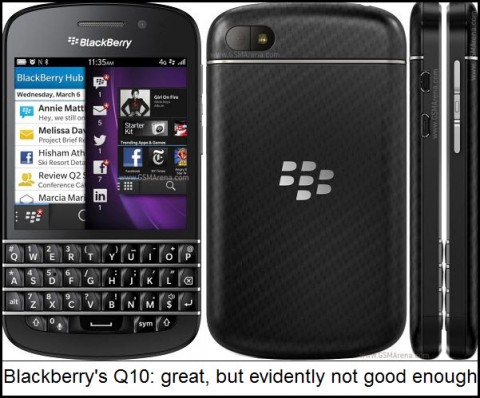With all respect to Scott Fitzgerald, there would appear to be more than a few second acts in American lives. But let it be said that there are almost no second acts in the high-tech business. Thus, while a sociopath like Eliot Spitzer is on the verge of clawing his way back to quasi-respectability after having plummeted into a Mindanao Deep of disgrace, Blackberry, on the other hand, still looks like a goner. Recall that the parent company, Research In Motion, nearly flatlined a couple of years ago after failing to anticipate the paradigm-changing capabilities of the smart phone. When Blackberry very belatedly jumped on the Android-powered bandwagon, the effort received muscular support from the press, presumably because thousands of reporters and editors were still hooked on Blackberry’s uniquely comfortable keyboard. They remained journalistically loyal to the device with some obsequious ray-rahs and full-page feature stories, even after the company’s 2.0 release proved to have been a work in progress – one that needed fixes for a few bugs and minor functional shortcomings.
One might infer that RIM at that point was muddling through Act III; but in fact the firm was, and still is, slogging through the third scene of an extended Act II that will never be completed. We wish it were otherwise, since RIM has tried so hard to get it right. But here’s a recent headline –let’s call it a death notice – culled from an online source: Research In Motion Posts Huge Q1 Miss: First Net Loss in 8 Years, Blackberry Launch Delayed, 5000 Jobs Cut. In response to all of the bad publicity, Blackberry’s CEO has done what any CEO would do – i.e., pleaded for more time. We truly wish him well, since, in trying to reinvent itself on an extremely unforgiving deadline, Blackberry has done as well as it conceivably could have. Unfortunately, to have gotten back in the race with the likes of iPhone, Samsung and Google, the new-and-admittedly-improved Blackberry Q10 would need to read users’ minds, pick Trifecta winners, repel sharks and notify forgetful male users to zip up their flies.
With the foregoing in mind, here’s a short list of other companies struggling through second acts that we fully expect to fail: Zynga. Yahoo. Dell. Hewlett-Packard. General Motors. And let’s not forget Microsoft, our favorite candidate for the longest failed second act of them all.


The android based model has dominated. Anyone competing with it lost. Apple remains a niche player since it carries the elitist styling, and quality. the same may be true for Blackberry. Both will not have any future meteoric rises, but might be able to survive.
The PC business will be gone very soon, almost as dramatically as Kodak’s film empire. Microsoft, while always late to the party, has stayed in the game. They are a cash giant, and any smart CEO will keep their business running with acquisitions. It will stay a player like Sony has. Large employer, low profit margins, lousy stock choice.
The Facebook infant doesn’t seem to have what it takes to mature into a giant. Who knows, as new technology emerges some name brand player will have a great advantage. It will be more difficult to find the diamond in the rough since most of the established players will quickly acquire the competition.
&&&&&
Any “smart CEO” in this case means Ballmer, who has succeeded only in channeling the skills of an evidently bright and talented work force toward failure. And why should Sony survive. In fact — Thank you, Gary — Sony is as good an example as any of the ones I gave that there are no second acts in the high-tech business. RA